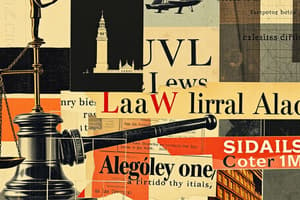Podcast
Questions and Answers
What is litigation?
What is litigation?
- The paperwork filed with the court
- The process of settling a dispute out of court
- The process of bringing, maintaining, and defending a lawsuit (correct)
- An informal negotiation between parties
What are pleadings?
What are pleadings?
The paperwork that is filed with the court to initiate and respond to a lawsuit.
What is a summons?
What is a summons?
A court order that directs the defendant to appear in court and answer the complaint.
What is the answer in legal terms?
What is the answer in legal terms?
What is a cross complaint?
What is a cross complaint?
What is a reply in legal terms?
What is a reply in legal terms?
What is intervention?
What is intervention?
What does consolidation mean in legal context?
What does consolidation mean in legal context?
What is a class action lawsuit?
What is a class action lawsuit?
What was the significance of Walmart vs. Dukes?
What was the significance of Walmart vs. Dukes?
What is the statute of limitations?
What is the statute of limitations?
What is a deposition?
What is a deposition?
What are interrogatories?
What are interrogatories?
What is the production of documents?
What is the production of documents?
What does physical or mental examination refer to?
What does physical or mental examination refer to?
What are pretrial motions?
What are pretrial motions?
What is a motion for judgment on pleadings?
What is a motion for judgment on pleadings?
What is a motion for summary judgment?
What is a motion for summary judgment?
What is meant by the trier of fact?
What is meant by the trier of fact?
What does voir dire involve?
What does voir dire involve?
What is the format of a trial?
What is the format of a trial?
What is an appeal?
What is an appeal?
Who is the appellant?
Who is the appellant?
Who is the appellee?
Who is the appellee?
What are frivolous lawsuits?
What are frivolous lawsuits?
What is alternative dispute resolution?
What is alternative dispute resolution?
Flashcards are hidden until you start studying
Study Notes
Key Legal Terms in Litigation
- Litigation: Involves the process of bringing, maintaining, and defending a lawsuit.
- Pleadings: Important paperwork filed in court, including the Complaint, Answer, Cross-complaint, and Reply.
- Summons: A court order requiring the defendant to appear in court and respond to the complaint.
- Answer: The defendant's written response to the plaintiff's complaint, filed with the court.
- Cross Complaint: Document filed by the defendant against the plaintiff to seek damages or remedies.
- Reply: A response from the original plaintiff to the defendant's cross complaint.
Procedural Actions in Lawsuits
- Intervention: The act of additional parties joining an ongoing lawsuit.
- Consolidation: The court's action to combine two or more separate lawsuits into one for efficiency.
- Class Action: A lawsuit where a group of plaintiffs with similar claims collectively sues a defendant, requiring certification by the appropriate court.
Notable Case Study
- Walmart vs. Dukes: A class action lawsuit involving allegations of sex discrimination against Walmart, where the Supreme Court ruled against class certification due to differences in individual circumstances of plaintiffs.
Legal Timeframes and Processes
- Statute of Limitations: Establishes the time limit for a plaintiff to file a lawsuit, beyond which the right to sue is lost.
- Deposition: Oral testimony taken under oath from a party or witness before trial, recorded for later use.
- Interrogatories: Written questions that one party submits to another in a lawsuit.
- Production of Documents: A party's request for relevant documents from another party prior to trial.
Examination and Pretrial Procedures
- Physical or Mental Examination: Court-ordered assessment of a party's injuries before trial.
- Pretrial Motions: Requests made to the court to resolve parts of a lawsuit before trial, including:
- Motion for Judgement on Pleadings: An assertion that, if all pleadings are accepted as true, the movant would win based on law.
- Motion for Summary Judgement: Claiming no factual disputes exist and that the judge can decide the case without a jury.
Trial Process Overview
- Trier of Fact: Refers to the jury in jury trials, or the judge in bench trials.
- Voir Dire: The process of questioning potential jurors to uncover any biases.
- Trial Format: Sequence of events includes opening statements, examination of witnesses, rebuttals, closing arguments, jury instructions, deliberation, and verdict.
Appeals Process
- Appeal: The act of requesting a higher court to overturn a decision made by a lower court.
- Appellant: The party initiating the appeal.
- Appellee: The party responding to the appeal.
Frivolous Lawsuits and Alternative Dispute Resolution
- Frivolous Lawsuits: Cases lacking merit, as illustrated by Pearson vs. Chungs, where a $54 million suit for lost dry cleaning was deemed baseless.
- Alternative Dispute Resolution (ADR): Methods to resolve disputes outside of court, including:
- Negotiation: Discussion to reach a voluntary settlement.
- Arbitration: Involves a third party making binding or non-binding decisions.
- Mediation: A third party facilitates negotiation between disputing parties.
- Mini Trial: A shortened trial-like procedure with presentations by lawyers.
- Fact Finding: A third-party investigation without decision-making power.
- Judicial Referee: Court-appointed official handling private trials, with outcomes recognized as judicial decisions.
Studying That Suits You
Use AI to generate personalized quizzes and flashcards to suit your learning preferences.




